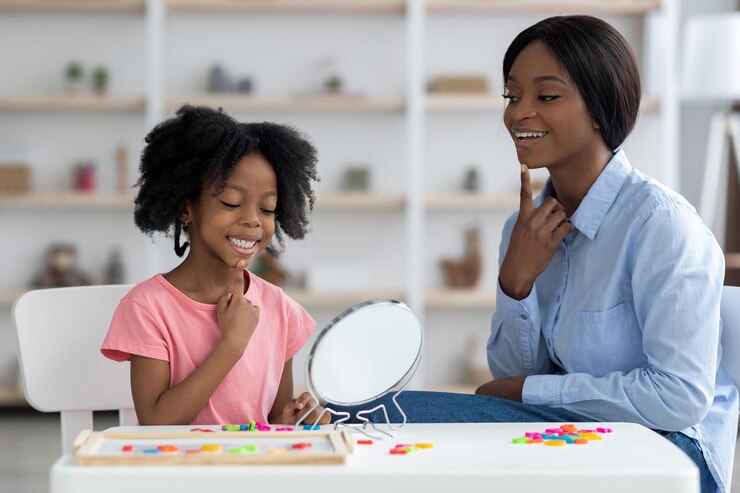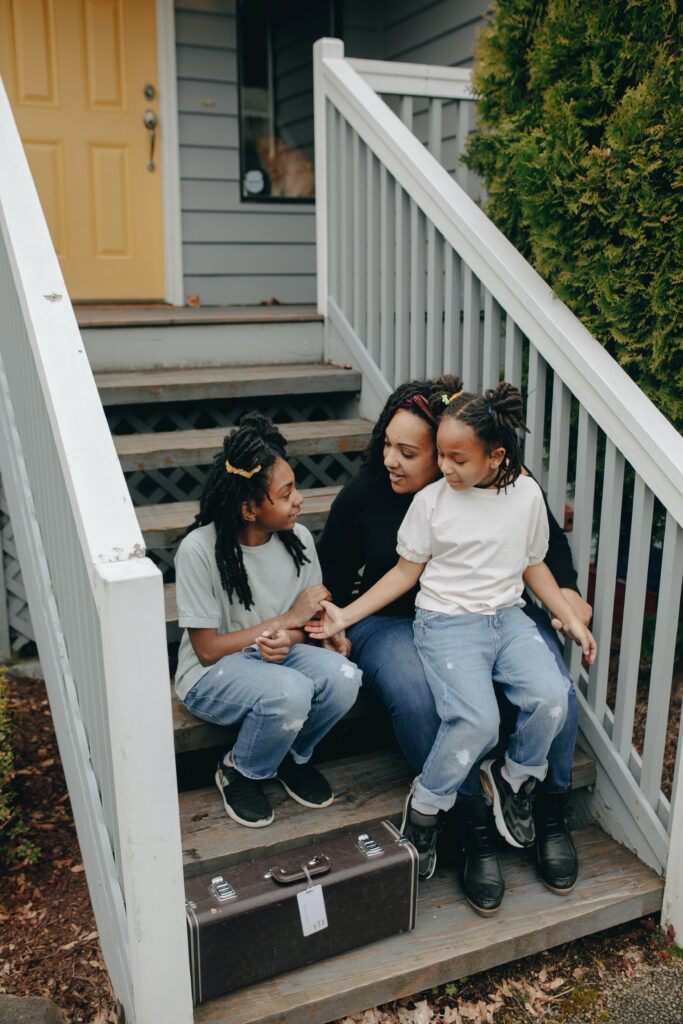The puberty phase is a critical one in your child’s life due to the significant changes that your child experiences. Your child needs to understand the changes that occur in his/her body and the ways of dealing with these changes.
As a parent, you have the responsibility of explaining puberty to your child. It is also best to do this early enough so that your child knows how to respond to the changes of puberty before he/she starts to fully experience them.
If you are a parent who finds puberty an uncomfortable topic to talk to your child about, then you are not alone, as many parents also feel the same way. Research indicates that many parents find talking about puberty with their kids uncomfortable. Perhaps, you even desire to explain puberty to your child but don’t know how. This article has been written to help you know how to explain puberty to your child. Here, we describe puberty and the changes that accompany puberty. We also share tips on explaining puberty to your young girl and boy.
What is Puberty?
Puberty is that stage in a child’s life when he or she is transitioning from childhood to adulthood. This transition occurs to prepare the child for adulthood, as puberty comes with many changes depending on the age or stage of the child.
According to Professor James M. Tanner – a child development expert who first identified the visible changes of puberty, there are five stages of puberty which he called the Tanner stages.
Physical changes in the body come with each stage of puberty in boys and girls. There are also emotional changes that growing children experience. The timeline of these stages differs in children because their bodies are not the same.
Physical Changes During Puberty
The physical changes of puberty occur in stages. As a child grows in age, he/she moves from one stage to another. Below, we have briefly highlighted the expected physical changes in boys and girls.
For a girl who is undergoing puberty, her first experience will be the budding of her breasts and the growing of hair in her armpit and pubic areas. Afterwards, her hips and thighs will build up. Also, menarche i.e., her first menstrual period occurs before she starts to have a regular menstrual flow. As she matures, she experiences fuller growth in her body.
For a boy, puberty starts with the growth of his genitals, hair growth in his armpit and pubic areas and cracking of his voice. As he grows, his voice gets deep, his chest becomes broadened and some breast tissues form on his chest. Afterwards, he will begin to have facial hair and stronger muscles. He might also have some episodes of wet dreams at night and occasional erection but this does not last for long. As he matures, his body will be fully formed.
Both boys and girls experience increased growth in height and weight during puberty. Usually, the girls start growing in height before the boys but the boys soon overtake them and become taller and more muscular. Acne i.e., pimples is also something that boys and girls often experience in puberty.
Emotional Changes During Puberty:

Physical changes aren’t the only changes experienced during puberty, there are also emotional changes. This is because puberty is triggered by hormones that prepare the body for adulthood. A child’s brain is learning how to deal with these hormones and also strengthening the parts that allow them to feel intense and complex emotions.
During puberty, boys and girls have mood swings, get more conscious about their appearance, get attracted to the opposite gender and crave their privacy. It is also a phase of their lives when they question their identity and have to deal with peer pressure; so, it’s not uncommon for them to feel confused, upset, angry and sensitive.
As a parent, you should watch out for troubling signs of depression or anxiety, like difficulty in sleeping, negative speech, eating disorders, school avoidance, or poor performance in school. Make sure you are close to your child and give them assurance regarding their identity. Also, it is important you teach them good moral values to uphold.
If you notice any extreme case of troubling behaviour like depression, disorder, poor academic performance, rebellion etc., then it can be discussed with the school counsellors or childcare professionals.
At What Age Should I Explain Puberty To My Child?
Most girls start puberty around 8 and most boys start at 9 or 10; nonetheless, this may differ in children because all bodies are not the same.
If you have a girl child, it’s best to start preparing her mind from age 8, even though she may not start at that time. However, for a boy child, you can start preparing his mind at age 9 or earlier depending on how receptive he is to the topic.
As mentioned earlier, there are several stages of puberty with different signs and expectations for each stage; however, those signs may occur earlier or later in boys and girls. For instance, if your boy child experiences wet dreams at age 11 and your girl child starts menstruation at age 13, it’s not abnormal. There are also cases of early or late puberty, where children experience puberty earlier or later than the average child. Typically, children with high body mass index (BMI) start puberty earlier than children with low BMI.
However, in extreme cases where a girl or boy has not experienced puberty by age 15, then you should take him or her to see a doctor.
Now that puberty has been explained, the next important thing to know is how to talk to your child about puberty. Ways of doing this have been listed below.
How To Explain Puberty To Your Girl Child
1. Note the changes that are peculiar to girls.
Changes peculiar to girls include breast growth, growth in hips and buttocks, and menstruation.
For girls, menstruation is an issue of concern. Six to twelve months before she starts menstruating, she might start to have a small to moderate amount of clear or white vaginal discharge. This is a response to growing amounts of the oestrogen hormone in her body. She may also have some red-brown discharge in her panties just before her first period.
A girl’s first menstruation is called menarche after which she may not menstruate for months. Once she starts menstruating again, her menstruation/period becomes regular. The timeline for monthly period cycles ranges from between 23 and 27 days.
2. Educate her on how to deal with those changes.
As your daughter experiences puberty, she would need to wear a bra that fits and underwear to cover sensitive areas in her body. She would also need to know how to wear pantiliners and sanitary pads, and how to dispose of them. Make sure to explain all these to her.
Let her carry a sanitary pad and panties in her backpack, in case her first menstruation starts in school or somewhere far from home. Inform her to keep her body clean, and to stay healthy.
Also, she should know that abdominal pain during periods is a common occurrence but the right pain relievers can ease the pain. If the pain is extreme, take her to a doctor.
3. Teach her how to deal with peer pressure.
Peer pressure for a girl can come from her appearance, her friends’ bodies, attention from boys etc. If she feels insecure about her body and compares herself with her peers, assure her that she is beautiful the way she is.
Bodies aren’t the same; so, her body may not take the same growth pattern as her friends or women in the media. This doesn’t make her worse or better than anyone. Encourage her to make healthy eating and lifestyle choices.
4. Teach her how to deal with the boys.
As your girl matures, she is prone to have a lot of attention from boys. At this stage in her life, she needs to be mindful of her relationships with boys and men. Her body may tell her otherwise but let her know the consequences of a wrong relationship with boys, e.g., distraction in academics, morality, pregnancy, infection etc.
How To Explain Puberty To Your Boy Child
1. Take note of the changes that are peculiar to boys.
Changes that boys experience include growth of pubic hair, facial hair, hair in armpits, larger genitals, deeper voice, strong muscles, erections and ejaculations (wet dreams).
Some boys worry about wet dreams (ejaculation) and erections. Wet dreams occur when semen comes out of a boy’s genitals. It typically occurs at night when he is sleeping and it makes his panties wet. Both ejaculation and erection indicate that a boy is becoming fertile i.e., capable of reproduction.
2. Educate him on how to deal with those changes.
The changes that a boy goes through make him self-conscious and may lead to sexual thoughts. These changes should be managed by avoiding self-comparison, healthy practices and positive thoughts.
He should bear in mind that his body will adjust to these changes over a period of time. Some of the changes like wet dreams and involuntary erections will pass with time. He should keep himself engaged in activities that interest him like sports, art or video games etc.
3. Teach him how to deal with peer pressure.
Peer pressure for a boy can come from his male friends, his appearance, performance in school and extracurricular activities.
He may be pressured into taking hard drugs or alcohol, bullying, having sexual relationships with girls etc. Teach him to uphold good moral values and have a healthy lifestyle. You should also encourage him to keep good friends.
4. Teach him how to deal with the girls.
As his body grows, a boy gets more attracted to girls. Also, he takes notice of the changes in his female friends. He may be tempted to engage in something immoral. Teach him to see all girls in a platonic way. Inform him of the consequences that can come from an immoral relationship.
Both boys and girls tend to sweat more during puberty; so, encourage them to shower frequently, especially after playing and use deodorants.
Now that we’ve described how to explain puberty to your girl and your boy, here are ten things to consider when explaining puberty to your child.
Things to consider when explaining puberty to your child
1. Don’t wait for a particular time to explain puberty.
Instead of waiting, you need to take puberty talk as an ongoing conversation that you have with your child as he/she grows. This can be achieved by spending quality time with your child.
2. Make the information age appropriate.
Puberty occurs in stages, therefore endeavour to give your child information that is appropriate for his/her age to avoid putting the child into enquiry mode for things he can’t fully comprehend. As your child grows, keep him/her informed on the changes that will occur and let your child know things to expect as puberty progresses.
3. Explain puberty in a neutral way.
If you whisper, show discomfort or go to secluded places to explain puberty to your child, he/she may see puberty as something shameful. However, some level of privacy is required when explaining puberty to your child. Just make sure you portray puberty as a normal part of growing up.
4. Use the right terms to explain what occurs at puberty.
Be clear about the areas of his/her body that will experience changes when explaining puberty to your child.
In some situations, it helps to have a mother explain puberty to her daughter and a father to his son. This is however not a rule of thumb because different factors may warrant a mother teaching her son about puberty and a father teaching his daughter. It is better when both parents can teach either gender.
5. Allow your child to ask questions.
When explaining puberty to your child, give room for questions. No question should be disregarded or seen as irrelevant; otherwise, your child can seek answers from misleading sources.
Questions e.g., your daughter asks you why she has white discharge in her panties or your son asks why his panties are wet when he didn’t pee on himself, should be paid attention to and answered. Let your child feel comfortable enough to ask questions.
On occasions when you cannot attend to your child’s questions or when you don’t have the answers, give an assurance that you’ll create time to answer the questions and ensure to fulfil your promise.
6. Get books on puberty.
 To help your child understand puberty better, get books on puberty to guide him/her through the puberty process. A reserved child may prefer to read about puberty than have a conversation.
To help your child understand puberty better, get books on puberty to guide him/her through the puberty process. A reserved child may prefer to read about puberty than have a conversation.
Consult a school librarian or bookstore owner to help you select insightful books on puberty. You can also join a parenting group to help you with good resources that can be beneficial to your child experiencing puberty.
7. Give your child practical tips.
For a girl, tips like how to find a bra that fits, the right undergarments to use, how not to get stained, and how to wear and dispose of a sanitary pad, are some of the practical tips that you need to explain to your girl.
To boys, tips like wearing neat underwear, shaving, how to deal with erection and wet dreams etc., are examples of practical tips.
To both genders, share information on healthy practices like being neat, regular exercise, healthy eating, personal space, wearing deodorants etc.
8. Accompany your child to get items needed during puberty.
This will make your child know the things to use and how to deal with the changes of puberty. It is particularly helpful for your girl-child.
Accompany your girl to buy Items like bras, underwear, sanitary pads, deodorants etc., and go with your boy to buy items like boxers, singlets, deodorants, shaving creams and shaving sticks.
9. Talk to your child about sex, pregnancy and STIs.
During puberty, many hormonal changes occur to prepare your child for reproduction. Attraction to the opposite sex is heightened and if not controlled, can lead to harmful effects.
The puberty stage is a good time to talk to your child about what sex entails, sexually transmitted infections (STIs), and pregnancy. As you explain puberty, make room to talk about these things. Teach your child your family values, and inform him/her of the appropriate ways to deal with the opposite gender.
10. Share your personal experience.
A great way to explain puberty to your child is by sharing your puberty experiences. Share challenges you faced and how you were able to deal with the changes of puberty. Your child will be delighted and happy to hear your story.
Talking to your child about puberty does not have to be difficult. At first, you or your child may be uncomfortable; however, by having frequent conversations with your child, it will be effortless to explain puberty to him or her. With time, you’ll look forward to such conversations and learn more about your child.
The conversation is even easier when your child is enrolled in a school that educates him/her appropriately about it. A child often develops a healthy attitude and behaviour towards puberty when he/she is guided through this phase both at home by the parents and at school, by the teachers.
Here at Greensprings School, we have a programme tagged “Man-Up” for boys and “Girl-Up” for girls, where our students are enlightened on a variety of topics relating to moral values and growth in general, including addressing questions that may be helpful to students at the puberty stage.




